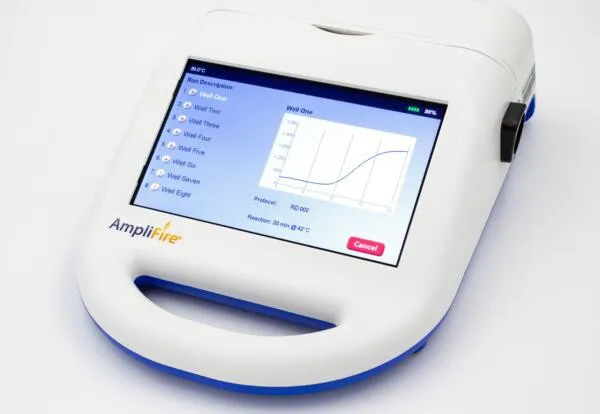Agdia announces the commercialization of a DNA-based assay on their AmplifyRP® XRT platform for the detection of Ralstonia solanacearum race 3 biovar 2 (RsR3B2).
Ralstonia solanacearum (Rs), formerly known as Pseudomonas solanacearum, causes bacterial wilt in numerous crops of economic importance worldwide. It is the causal agent of diseases including Southern wilt of geranium, Bacterial wilt of tomato, brown rot of potato, Moko disease, Bugtok disease, and Blood Disease of banana.
Ralstonia solanacearum is listed as an A2 (high risk) quarantine pathogen in the European and Mediterranean Plant Protection Organization (EPPO). In the United States, Ralstonia solanacearum race 3 biovar 2 is a Select Agent due to the potential impact on the domestic agricultural industry.

You can pair the new assay with Agdia's AmpliFire® portable isothermal fluorometer.
In 2020, Ralstonia solanacearum race 3 biovar 2 was detected in a U.S. greenhouse for the first time in 16 years. The infestation was traced back to geranium cuttings from an offshore location. Extensive testing and prompt mitigation efforts were employed to successfully eliminate the pathogen.
Agdia’s new AmplifyRP XRT assay for detection of Ralstonia solanacearum race 3 biovar 2 is based on recombinase polymerase amplification (RPA). This technology promotes the rapid amplification and detection of nucleic acid targets, DNA or RNA, while maintaining a single operating temperature of 39–42 °C. The AmplifyRP XRT products achieve sensitivity and specificity comparable to PCR, while having clear advantages over the lab-based technology.
AmplifyRP XRT products do not require a nucleic acid purification step; crude sample extracts are prepared using a simple extraction buffer and tested directly. When paired with Agdia’s AmpliFire isothermal fluorometer (figure 1), the XRT system is a user-friendly tool that can be implemented in the field or the lab by personnel with limited experience in molecular diagnostics. Total assay time is less than 30 minutes when used with the AmpliFire as a real-time assay.
Extensive product validation was conducted to demonstrate fitness for purpose. Agdia states their new assay was screened against 62 bacterial cultures representative of other races and biovars of Rs in addition to 117 cultures of other relevant bacterial species. No cross-reactivity was observed, confirming exclusive specificity of the assay to RsR3B2. Additionally, no host reactions were observed in validation testing against geranium, tomato, potato, pepper, ginger, banana, or eggplant samples. The new assay successfully detected all 19 distinct cultures of Rs race 3, biovar 2.
For more information:
Agd ia Inc.
ia Inc.
52642 County Road 1
Elkhart, IN 46514
phone 1-574-264-2615
fax 1-574-264-2153
[email protected]
www.agdia.com
